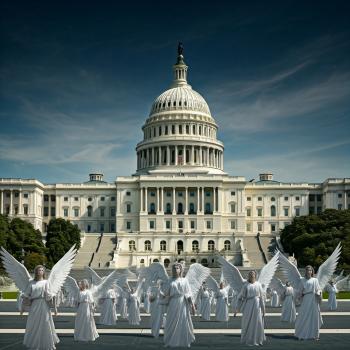Candida Moss, “What the Hell Is the Purpose of Hell?”
In her book, Educating Early Christians through the Rhetoric of Hell, Professor Meghan Henning of the University of Dayton argues that whole question “Does hell exist?” is a post-Enlightenment one. The ancient authors who first dreamed up a torturous afterlife were more interested in using hell to turn people into ideal citizens than in describing the layout of an actual place. In other words, hell is more about pedagogy for the present than it is about the fate of the soul in the future. To ancient Christians the questions “Who should be in hell?” and “Why should they be there?” was more important than “Is this a real place?”
Henning told me, “This is very different from the way that hell functions rhetorically today. … [Today hell is used] to offer some black-and-white pronouncement that a person is once and for all ‘saved’ or ‘not’ based upon their confessional status. This usually is the result of importing ancient images into the contemporary context without any reflection on the differences between the ancient world and our own.”
Libby Anne, “On Orgies, Bisexuality, James Dobson, and Evangelicals”
As more people have openly gay individuals in their lives, evangelicals are increasingly faced with a choice. They must either deny the lived experience of the (often few) LGBTQ individuals in their lives, or they must reject the image they have been given of LGBTQ individuals by their pastors or other evangelical leaders as false. If they do the latter, they have to find a way to adjust their belief system to account for this new understanding of LGBTQ individuals. And there are evangelicals today who are doing this, though I don’t have percentages. The path of least resistance, however, is to simply deny, deny, deny, and hold tight to the unquestioned belief system, and that is what most seem to be doing, at least for the moment.
Associated Press, “Your seafood might come from slaves”
The Burmese slaves sat on the floor and stared through the rusty bars of their locked cage, hidden on a tiny tropical island thousands of miles from home.
Just a few yards away, other workers loaded cargo ships with slave-caught seafood that clouds the supply networks of major supermarkets, restaurants and even pet stores in the United States.
Here, in the Indonesian island village of Benjina and the surrounding waters, hundreds of trapped men represent one of the most desperate links criss-crossing between companies and countries in the seafood industry. This intricate web of connections separates the fish we eat from the men who catch it, and obscures a brutal truth: Your seafood may come from slaves.
Ronald E. Osborn, in Death Before the Fall: Biblical Literalism and the Problem of Animal Suffering
There may in fact be a fateful connection between longstanding Christian readings of Genesis and Christian complicity in the destruction of the planet. …
Why, after all, should believers care about the nine billion animals butchered annually in the United States — the cattle routinely dismembered alive, the hogs plunged still conscious into vats of boiling water, the birds packed so tightly into cages to be trucked thousands of miles that they often arrive crushed and suffocated on delivery — if the God we worship is a God whose creation is simply a mode of “stamping” animals into existence by verbal decree before delivering them over to humans for their instrumental “dominion” / consumption? Why should Christians care about the abuse inflicted every second of every day upon sentient creatures in slaughterhouses around the world if the divine benediction was immediately superseded by a divine malediction or “curse” upon all animals? And if the world is bound for a fiery conflagration in the near future in which all animals will be destroyed by God anyway, as many fundamentalist Christians believe, why should we care about their suffering in the present or invest our time and energy in alleviating their pain? Shouldn’t we instead devote ourselves to “evangelism” (ignoring the fact that the greatest likely cause of planetary destruction is not divine intervention but the rapaciousness of human beings themselves, or that the euangelion of Christ in the New Testament is a summons to dikaiosyne, which means not simply righteousness but justice)? Or again, if humans have no intimate familial relationship with the rest of the animal world, why shouldn’t human “subduing” take the form of unrestrained predation and violence upon other creatures?
Matthew Frost, “The Relief of Being Able to Take the Bible Seriously — and Not Conservatively”
At rock bottom, the Modern approach represented by these 20th-century figures isn’t about shaking peoples’ faith in scripture; that had already been done, as much by the normal activity of conservatives as by the oft-cited extremes of Liberal scholarship. Both sides, in their infighting, managed to significantly damage their own credibility. But out of the postwar periods there developed something of a pastoral concern for Moderns. … There arose the question of believing the Bible, not propositionally, not as doctrinal or dogmatic assent, not as the basis for authoritative teaching, but in its own terms. And of disbelieving parts of the Bible on its own terms, and arguing with it, and bringing out its internal issues for genuine and faithful critical study. This doesn’t remove authority from the Bible; it insists that the Bible is authoritative and also problematic, and that we have every right to say so, and dig deeply in it, and bring out those problems, and let them be a problem for the church as well.















